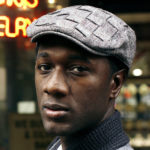Recently I came across a quote from artist/songwriter Aloe Blacc. What he said seemed almost too obvious… until I realized he was talking about things that sometimes seem so obvious that they don’t get said enough.
“Make a list of songs that you think are great, whether it be great for its catchiness, emotional value, etc. Then figure out what they have in common.
Do they all start with the hook/chorus, what’s the average length? How many separate parts are there?
Then, when you have your own idea for a song, you can use your list as a guide to building it’s structure.
As for lyrical content, the more personal, the more universal. My favorite comedians make me laugh the most when I can relate to the content.
Until you’ve logged a lot of hours writing stories and situations outside your own experience, its easiest to go with what you know and what moves you personally if you want to move others.
Finally, you have to swing the bat a lot of times before you can expect to hit one out of the park. I have a voice recorder filled with hundreds of song ideas that might not see the light of day, but the gems reveal themselves one day.”
In other words, study the songs I love – or, as I like to say, ‘break them down’. For example, a few things to listen for:
* Structure –
What’s the structure of the song? (Verse/Chorus? AABA? etc.)
How long is it?
How long does it take for the Chorus to come in?
Does it have a Bridge?
Where is the Title placed (if anywhere)?
Do the songs I like tend to be Title-dependent? Or not?
* Lyrics –
What’s the rhyme scheme? How strictly does the writer stay with it?
Which sections of the lyric are repeated, which are not?
How do the sounds of the words feel when I sing them (not on paper)?
There’s also the storytelling aspect of the lyric – how is the story told? Chronologically? Does it jump around? As well as the emotional aspect – what are the powerful peak moments of the lyric? How does the writer get there? How does it make its emotional connection?
Is the language used to create character… and/or a sense of place? If so, how?
* Melody –
What’s the range of the song? Is it easy for anyone to sing, or is it a ‘singer’s song’?
How does it combine the melody elements of step motion, repeated notes, and leaps?
Is there a lot of motion and variety, or not?
Is there a melodic climax? If so, how is it set up?
Then I might play and sing the melody with just the main bass notes, to hear how the top and bottom of the harmony sound together. Then I’ll add in the full chords, or the riff (if the song has one), to hear how the melody is harmonized. This leads to:
* Harmony –
What are the chords of the song? Or the bassline, if that’s the important thing?
Are there a lot of chords, or a few?
Does the key change? Does the song even seem to have a key?
What’s the rhythm of the chords and how do they interact with the melody’s rhythm?
And I always pay special attention to the aspects of a song I really love, even if it’s just a bar or a few beats. What exactly is going on there? Often it’s something I can use. Sometimes right away!
In doing a breakdown I often find things I think could’ve been done better. Most songs that are good are still not genius, not perfect. And that’s worth knowing too – what I don’t like, what to avoid.
The above are approaches to breaking down songs (and many more questions can be asked) that I find useful. It all helps me develop a more informed opinion about why something is working for me – or not. And that’s information I can use.
Blacc also says to look for the commonalities across songs – what do the songs that work have in common? This can create or solidify a bedrock of Songwriting ‘beliefs’ (for lack of a better word). Not a dogma, but a foundation.
Please let me know your thoughts in the Comments section below:
And please share on facebook etc. by clicking the tabs below the video –


very interesting
Thanks, Joyce!
TC
Unlike most songwriting gurus, you fully accept that we are 21 years into the 21st century in this blog post. You ask to see if the song in question have full chords or a riff. What are the chords – or is the bass line the important thing. What is the song’s key or does it even seem to have a key. Ie you have accepted that many songs no longer have a traditional melody 100% wedded to block chords below but are now in a form of counterpoint wherein the melody shows considerable pitch and timing independence from the riff and bass-line below. bravo !
Thank you, Michael.
I didn’t intentionally stress what you reflected back to me, but it is indeed what I also believe to be true, and I’m glad my conviction came through.
Songs have changed, so the way we think about them and write them changes too.
I’m a songwriter, not a songwriting guru! So I’m not on a pedestal, I’m in the trenches.
I really appreciate the kind words.
Best wishes,
Tony